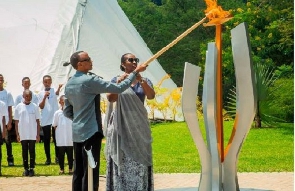 Rwandan President Paul Kagame and First Lady Jeannette Kagame light the Flame of Hope
Rwandan President Paul Kagame and First Lady Jeannette Kagame light the Flame of Hope
Rwandan President Paul Kagame on Friday paid tribute to people who lost their lives during the 1994 genocide against the Tutsi and reaffirmed that the country will never forget the tragedy that left over a million dead 29 years ago.
"It's very clear that the wounds are still deep but, Rwandans, I thank all of you, for refusing to be defined by this tragic history.”
At the same time, Kagame told individuals or groups spreading hate messages within the greater East African region to stop their actions as they bear a stark reminder of the embers that triggered the genocide.
Speaking Friday after laying a wreath at the Gisozi Genocide Memorial, a resting place of over 250,000 genocide victims, Kagame said that ethnic hate will not be tolerated within Rwanda or in the neighborhood as long as he is still in power.
Violence and hate speech
“We cannot ignore things like violence and hate speech that persists not so far from here,” noted President Kagame.
“You can also see the same indifference today as we saw in 1994.”
Rwanda plunged into a 100-day genocide that saw the Interahamwe massacre the Tutsi population in the country.
The build-up to the ethnic fighting was a peace process that was being undertaken in Arusha, Tanzania, but one that did not see the light of day after the aircraft carrying Rwandan president Juvénal Habyarimana and Burundi’s Cyprien Ntaryamira, both Hutu, was shot down as it prepared to land in Kigali, Rwanda.
On Friday, President Kagame said that the world looked the other way as the country plunged into anarchy.
Come a long way
But Rwanda believes it has come a long way since then, and hopes that a united front can enable the people to move forward. In order to keep this fire burning, a symbolic flame was lit at the memorial park and is expected to last 100 days in commemoration of the deaths of the many Rwandese nationals who were victims of the genocide.
“April 21st was a dark time for Rwanda. We lost almost 250,000 people in various places as the killers moved into the areas where they hid and hacked many,” said the Minister of National Unity and Civic Engagement Jean Damascene Bizimana.
The minister said that forgiving the perpetrators of the 1994 genocide against the Tutsi is a key factor in achieving unity.
Unity and resilience
“Forgiving the perpetrators of the 1994 genocide is proof of our unity and resilience. Today, we remember with happiness and appreciation what Rwanda has achieved. Those who still have the genocide ideology, we ask them to stop, learn from us and respect life,” the Minister said.
Eric Mwirezwa who lost his mother, uncle, brother, and sister in the southern town of Butare, said his past does not reflect the man he is today, and that he would not want his children to be defined by what happened then.
He noted that he was barely in his teens when the news of the killings reached his village.
He recalled that his eldest brother asked the family to take shelter at the local church.
“Three days after we arrived there, the Interahamwe came and killed many including the priest who gave us shelter,” Mwirezwa said.
President Kagame expressed hopes that the future generation will learn from those sad moments and become better leaders.